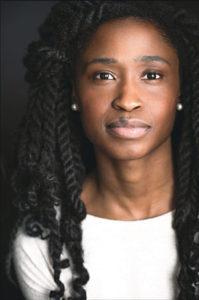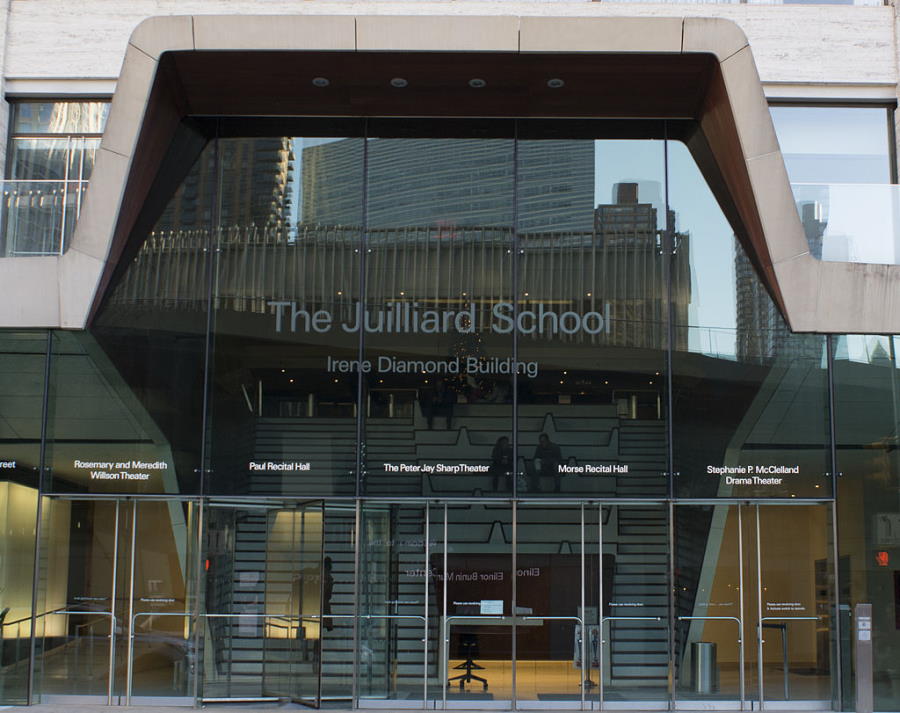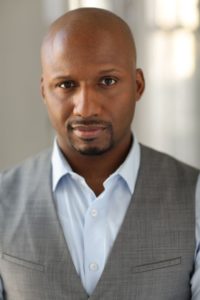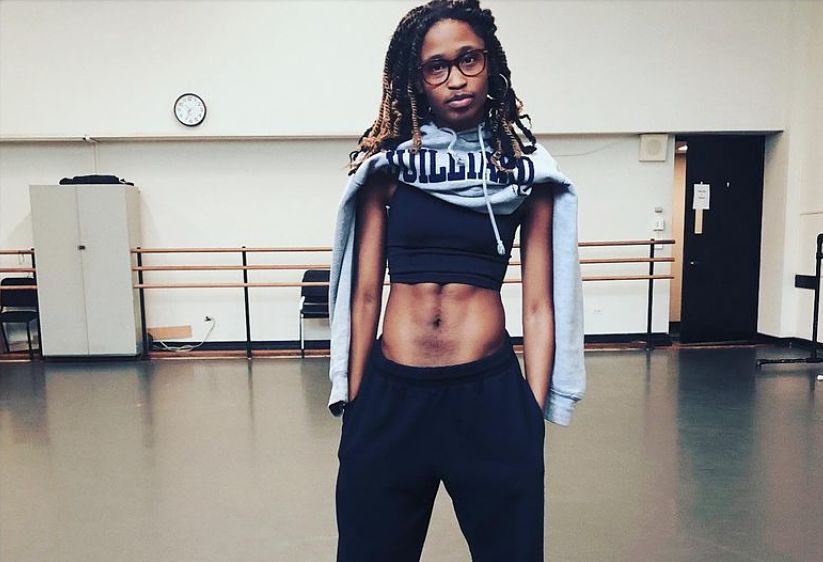Marion Grey felt blessed. It was the fall of 2019 and she was finally walking the hallowed halls of the acting school she’d “worked and prayed” and auditioned twice to get into: Juilliard Drama. A 27-year-old from Roanoke, Va., who’d gotten her undergraduate theatre degree from James Madison University, Grey (she/her) threw herself into her classes at the prestigious New York City school, and even after the pandemic hit last March kept herself active and engaged: Last summer, as president of the Juilliard Black Student Union, she helped make a video anthology of music, poetry, and dialogue titled “We the Black Artist.”
Sure, she had what she called in a recent interview “questionable moments”: microaggressions and other signs that Black students at Juilliard are viewed and treated differently from their white counterparts. But at the time, Grey said, these felt like the kinds of things “you let slide or you brush off, because they’re moments and they’re small.” When she first heard murmurs from Black alumni who tried to warn her of impending obstacles—that, in their words, “you can’t be Black and an artist at Juilliard”—she would have none of it. “I was like, ‘Excuse me, I’m Marion Grey. You don’t know that Juilliard and I were meant for each other.’”
But Grey’s second year at Juilliard Drama has been like a nightmarish photonegative of that first honeymoon year, and not primarily because of the social distancing required by COVID protocols, which rendered most instruction virtual. As she detailed last week in a video shared on Instagram and Facebook, an orientation exercise she and her fellow students and faculty were subjected to in September 2020—an immersive soundscape of cracking whips, rattling chains, slave auction shop talk, and racial slurs intended to viscerally recreate the experience of captivity—began the academic year with what she and other students experienced as pointless trauma, particularly at a time when incidents of violence against Black people in the U.S. were a persistent, unfolding real-time trauma.
The response of the university since then—which has included the usual apologies, task-force meetings, and vows to do better—have only made Grey and some of her colleagues feel like Juilliard wants to move on, to discount their experience, and to behave as if the terrible day Grey calls “Slavery Saturday” never happened.

“It felt like I was getting messages that I was an inconvenience—that I needed to move forward and get past this thing,” said Grey, who met with both Juilliard’s provost, Adam Meyer, and its president, Damian Woetzel, for conversations last fall that seemed “initially sincere” but ultimately made her feel “not truly supported.”
Since Grey’s video last week, Woetzel released a statement that said the aural slavery recreation “was ill-conceived and should not have occurred in the manner that it did.” In addition to his “heartfelt apology,” he concluded by appending a brief message from Evan Yionoulis, the director of drama, who wrote of her hope for a school culture in which “every student can feel seen, heard, celebrated, and free to reach their full artistic potential.”
Grey has felt none of these things this school year. Instead, she told me, over the past eight months she has often felt as if she’s “drowning, like I was yelling into nothing.” When, last December, she received news of which part she would have in a Shakespeare production at the school, usually “one of the most joyful things as an actress,” she instead had “the most severe panic attack I had had to date. I could not breathe. I thought I was dying. I was very scared.” She tried to meditate, and found “the first time I got a breath in, I just sobbed. I’ve been through so much that this is how my body responded. I couldn’t even control it.”
Grey’s experience is both an egregious illustration of the disparity between intention and impact, and a symptom of a general tendency toward racial insensitivity corroborated by other Juilliard Drama students I spoke to.
“In my mind, and in the minds of many students, racism is a part of Juilliard Drama,” said one of Grey’s colleagues, who asked to remain anonymous so they could speak freely. “And instead of addressing the issue and the trauma that is happening in these hallways, it’s all about, ‘Well, how do we move on?’” Added Lee Edward Colston II (he/him), an actor and playwright who got his MFA from Juilliard in 2016, “Every Black student I’ve talked to who graduated from Juilliard has trauma stories.”
Viewed more broadly, Grey’s is the latest in a series of cases in which predominantly white drama schools and conservatories are being called out by students of color for the harm they’ve inflicted. As a Black alumna, who requested anonymity, put it to me, “It’s not just something that is happening at Juilliard. This is happening at all of these drama schools, if they choose to reckon with it.”

‘There Are Wounds Here’
How did “Slavery Saturday” happen in the first place? Last fall students received an announcement about “community meetings” to address EDIB—Juilliard’s acronym for Equity, Diversity, Inclusion, and Belonging—as well as the school’s anti-racism work. It included meetings with Chanel Ward and Michael McElroy, the school’s EDIB consultants; discussions of “race in rehearsal” and “voice and speech and race”; and a guest visit with Sarah Bellamy, artistic director of the Penumbra Theatre and Center for Racial Healing.
Students and faculty would also be joining in “a three-day course, Roots to Rep,” offered by McElroy, who explained that it “combines history, research, and music to explore the journey of Black peoples in this country,” with a specific emphasis on the way “the Negro spiritual…is the foundation of so many musical genres today.” McElroy, a respected Black performer and teacher, had offered “Roots to Rep” in other settings with no apparent blowback.
To prepare for the first “Roots to Rep” exercise, “The Stolen Ones,” to be held on Sat., Sept. 5, students and faculty were asked to choose a topic from a historical timeline of Black enslavement in the U.S. and to write a paragraph about what they learned, and also to memorize a vocal part of the spiritual “I Been Buked.” Grey said she already felt a red flag go up, and the vivid poem she contributed in response to the reading assignment, titled “Imagination,” gave a preview of how she would respond to the audio exercise. “Imagine the rape of Land, Body, Culture, and Mind/Don’t imagine abstractly, imagine the body is mine,” she wrote, and concluded:
Imagine School ’bout to begin
& I imagine I’m finally free
Til I learn the first assignment
Is a paragraph on slavery…
I ask you, for a moment, imagine your body is me.
Grey said she is often asked why she didn’t raise an objection at this point, even before the audio exercise. Her rationale, she said, was, “I’m a student. I am paying here. I needed to know how far this could go before someone, anyone, did something—I needed to know, for myself, how protected I was here, how respected I was here.”
She got her answer on Sept. 5. McElroy did offer a trigger warning to the Black students gathered via Zoom that day that the audio contained the “n” word, and told them, Grey said, that they had “the law of two feet, which means we can leave or come back whenever we want.” But he did not warn them, Grey said, about the moment, around five minutes in, when they would be asked to “start down the road of captivity,” to the sound of forced marching and snapping whips; or about the later dialogue, lifted from the miniseries Roots, in which a white auctioneer gives a sales pitch about the “fine Black pearl” who will “raise you a fine litter of pickaninnies”; or the excerpt from the song, “Run, N—–, Run.”
Grey said that she and her Black classmates had their cameras off during this parade of horrors but were texting each other busily in distress; one colleague Facetimed her, Grey said, “And there was not a dry spot on her face. She was so utterly broken, I couldn’t even look at her. I said, ‘I’ll call you back.’”
Meanwhile the screen’s Zoom squares showed white students and faculty, and some students of color, going through the steps of the exercise earnestly and without protest. When, after it was over, the white participants began to comment about how moved they were by the experience, Grey could take no more. She said she asked to speak first and “went on for about 10 or 15 minutes” about the trauma she’d just experienced and her outrage that no one on the faculty had thought to stop it.
“I was like, ‘There are wounds here, and you don’t get to just explore someone’s history and culture with them—that is earned, you don’t just get that,’” Grey said, paraphrasing what she said that day. As another anonymous classmate who opted out of the exercise told me, “I don’t know a single Black person who needs to go through the experience of enslavement to understand what racism feels like today, and furthermore, it didn’t make sense to bring that into the school.”
The rest of the Roots to Rep exercises were called off, and meetings to address “racial issues at Juilliard,” as Grey put it, were convened in the following weeks and months, though she is quick to point out that these all came about at students’ instigation, not that of the leadership of the school. She also felt that the trust needed to adequately address these issues was lacking.
“I don’t feel like there’s a culture at Juilliard where the student’s voice is respected or even asked for a lot of the time,” Grey said. “There seems to be to me a culture of silencing. So having one discussion and asking us the question, ‘When have you felt silenced?’ does not mean you will get an answer, especially when you’re not in the practice of making space for the student’s voice.”
Black Folks’ Care
For nearly seven decades, Juilliard has been a byword of rigor in the performing arts, with world-class music and dance divisions. The drama division has been no slouch either, educating a who’s who of name actors from Robin Williams to Oscar Isaac, Wendell Pierce to Viola Davis. But on top of the usual stresses of education in the theatre, Black artists who’ve trained there say they’ve faced the added burden of racist incidents both big and small, and have felt unsupported in their efforts to address them.
Lee Edward Colston II now thinks of his Juilliard experience as “a mixed bag” of valuable training and psychological harm. “With any institution that is predominantly white, any time Black bodies enter that space, we’re already at a cultural disadvantage. White folks don’t prioritize Black folks’ care—that’s the general rule of thumb, unfortunately.”

While he watched many of his classmates experience the proverbial honeymoon period (“You’re excited to be there, you’re living your wildest dreams, you’re seeing actors you’ve seen on TV come in as guest artists”), he said he “hung back a little bit,” scoping out exactly “where am I safe and not safe?” Colston recounted an instance in which a professor told him he looked distant and “menacing” in class. “That’s a you thing, not a me thing,” he told her. He later witnessed a veteran acting instructor use the “n” word to motivate a Black actor to anger during a class. And that wasn’t the only instance of “teachers saying really fucked-up shit,” Colston said. “There’s no oversight, no code of conduct on how teachers get feedback. They say whatever they want, whatever you think you should be doing. The scrutiny they give us is not the scrutiny they want.”
A spokesperson for Juilliard said regarding Colston’s allegations: “Any reports of bias or racism made to Juilliard are taken very seriously” and forwarded to the school’s bias response officer—a position that was not in existence during Colston’s time there. Indeed, Woetzel, who began in 2017, has made anti-bias work a focus of his tenure, including establishing the EDIB department, creating workshops and affinity groups, seeking a wider representation of guest teachers, promulgating new practices for considering how race and ethnicity should be handled in rehearsal, and forming the Drama Anti-Racism working group, in which students, faculty, and staff meet regularly to discuss practices and processes in the division.
Colston said that he’d like to see Juilliard change not only its internal culture but its concept of the canon. When his professors told him during his final year that his enthusiasm had seemed to wane, he said he told them, “That’s because my light is gone. I’m tired of studying about how great white authors are. I want to work on material that comes from people who are like me, from my culture.” One professor responded, “‘But Lee, this is Juilliard—we only study the classics.’ Whose classics? Who gets to decide what a classic is?”
He zoomed out to the larger picture. “This was the same thing I heard at the University of the Arts in Philadelphia; it’s not a Juilliard thing, it’s a much larger thing,” Colston said. “This is happening at every acting institution across the country, because predominantly white institutions (PWI) have a monopoly on actor training across the U.S.”
Another alumna who asked to remain anonymous chalked up Juilliard’s problems to “a lack of understanding or real in-depth analysis of the systemic nature of a lot of the things that have been happening in that building that affect students. It’s just been allowed to fester for literally decades.”
What’s needed, this alumna said, is an inward transformation akin to the one the school asks of its artists.
“It’s not a math school, it’s not a science school, it’s an arts school,” she said. “And if you’re going to ask the students to be incredibly vulnerable and come into the space in that way, the least you can do as educators is to come in fully in that vulnerable way too, and say, ‘Okay, let me put my stuff out there too.’”
This is also a version of what Grey said she hopes for: that Juilliard Drama will recognize the harm it has done to her and her Black colleagues. And though the damage can’t be undone, she is hopeful that her advocacy could mean that no Black students after her are subject to the same.
“It feels like things are allowed to happen to Black students here, but then they go unresolved, unanswered, or unaccounted for, and so they just become a weight on the student,” Grey said. “We have to deal with things that happened that we didn’t ask for. For me, it was Slavery Saturday, but everybody has something. And these accumulate. They add weight.
“But we are still expected to show up to class, to open up in our work and be vulnerable. And sometimes we do! Nobody even knows what we’re going through or what a skill that is. But what a disgusting skill—to deal with all that we are asked to hold because people don’t recognize our humanity.”
Rob Weinert-Kendt (he/him) is the editor-in-chief of American Theatre.


